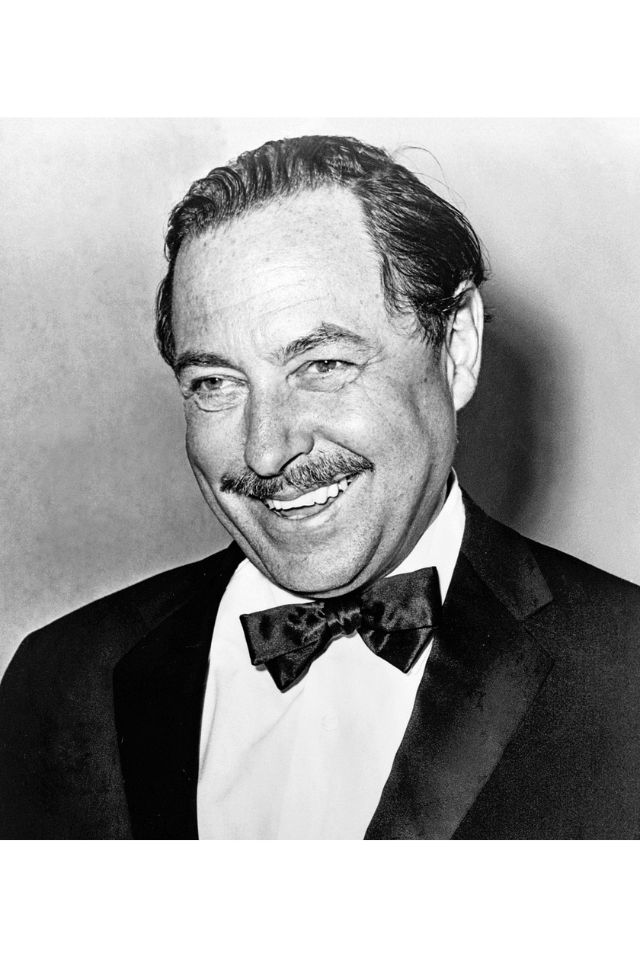
A Look at Tennessee Williams
Thomas Lanier Williams was born on March 26, 1911, in Columbus, Mississippi, to parents Cornelius and Edwina Dakin Williams. From an early age, Thomas, often called Tom, felt he did not belong anywhere. His father was often abusive, repeatedly taunting his son as a “sissy boy.” Edwina was a woman desperately holding onto a southern gentility that was out of place in her current environment, similar to Amanda from The Glass Menagerie. Of his two siblings, Rose and Dakin, Tom formed a very close attachment to his sister Rose, a woman with deep emotional problems who would eventually be diagnosed with schizophrenia.
Though he had been writing stories for years, it wasn’t until 1929, when Williams attended a university production of Ghosts by Henrik Ibsen, that he decided to become a playwright. He took a slight detour in his career when his father forced him to drop out of school due to a poor grade. Cornelius arranged for Tom to work in a shoe factory, a job he considered stifling. In 1935, not long after taking the warehouse job, Tom suffered a nervous breakdown. Shortly thereafter, Williams’ parents made a decision to have his sister Rose lobotomized, a decision that haunted Tom for the rest of his life.
Williams returned to school and graduated from the University of Iowa in 1938, moving to New Orleans shortly afterwards. There, Williams found a culture more openminded than any he had ever experienced. While there were still people in New Orleans who were judgmental about people of different sexual orientations than themselves, Tom found himself, for the first time in his life, fully embracing a gay lifestyle, an option that had been all but impossible in his previous living situations. In New Orleans, Tom became routinely known as “Tennessee,” named for the state of his father’s birth.
In 1940, Tennessee’s first full-length play to be produced, Battle of Angels, failed miserably. It was not until 1944 when The Glass Menagerie opened in Chicago and went on to have a very successful run on Broadway that Williams had his first taste of success. With The Glass Menagerie, Tennessee revisited his complex relationship with his mother and sister and his feelings about his family life. The journey of Tom, the character from The Glass Menagerie, mirrors much of Tennessee’s own life, although he took certain theatrical liberties. Following the attention he received from The Glass Menagerie, Tennessee now had to create a new play to compete with his new commercial and critical success. He found this work in a play originally entitled The Poker Night, which would eventually become A Streetcar Named Desire. When A Streetcar Named Desire opened in 1947, it became an instant success; Williams won a Pulitzer Prize for it in 1948.
At the same time as Williams was experiencing professional success, he also met and fell in love with a man named Frank Merlo. During the years he spent with Merlo, Williams was very productive professionally, creating three of his most famous plays: The Rose Tattoo, Cat on a Hot Tin Roof, and The Night of the Iguana. Williams was awarded his second Pulitzer Prize in 1955 for Cat on a Hot Tin Roof. However, when Merlo died in 1961 of lung cancer, Williams entered a ten year period of self-destruction and depression. He became addicted to alcohol and prescription drugs and suffered from an overwhelming fear that he would go insane. His work suffered greatly and most people agree that his later work lacks the spirit and quality of his earlier plays.
Williams choked to death on a bottle top from one of his prescription bottles on February 24, 1983 in New York City. Despite the fact that he considered New Orleans his spiritual home, his family insisted on burying him in St. Louis, Missouri, the city in which The Glass Menagerie takes place (and a city he despised). The body of work Williams left behind is impressive; it includes twenty-five full length plays, two novels, a novella, sixty short stories, over a hundred poems, dozens of short plays and screenplays, and an autobiography. The awards he received are too numerous to mention, but the most impressive include two Pulitzer Prizes, four New York Drama Critics Awards, a Tony Award, and an honorary doctorate from Harvard University.
He was honored by President Carter at the Kennedy Center in 1979 for his life’s work. In 1995, Tennessee Williams joined the small group of people honored by the U.S. Post Office when they released a stamp bearing his image honoring him for his playwriting work. Williams is undoubtedly one of the greatest American playwrights to ever live, and throughout his tumultuous life he created many rich plays and characters for the theatre.